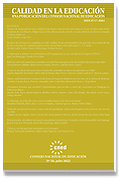Chileans with Disabilities Studying Abroad
DOI:
https://doi.org/10.31619/caledu.n56.1162Keywords:
higher education, inclusion, student mobility and inclusive mobility programmesAbstract
Currently, the mobility of students with disabilities in order to increase their knowledge abroad is very low, and there is quite little information about the reasons that explain this issue.
The present work, therefore, intends to identify the perceptions about the mobility experience of professionals with disability, who undertook a master"s degree abroad with the support of the Chilean state. This qualitative study was carried out through interviews to three of the total twelve professionals who were the first and only beneficiaries from the program. The interview and its analysis were based on the experts" selection of minimum national indicators that ensure a safe mobility, taking into account the official list of indicators from the European Union. The results show an optimum level of fulfillment from the host institutions in the area of infrastructure and the presence of a support unit for this group. On the other hand, the opposite is found in the professors" attitude towards the adequation of the teaching-learning process. In regard to the perception of the program, it is positive but at the same time they stress the necessity to review the application process in order to make it more flexible and inclusive, as well as improving the financial support assigned, which in some cases is not sufficient to fulfill the requirements of mobility in conditions of equity.
Downloads
Published
Issue
Section
License
Authors retain their Copyright and only transfer a part of these to the journal, accepting the following conditions:
Authors keep their rights as authors and guarantee the right to the journal for the first publication of their work, which is simultaneously subject to the Creative Commons Attribution license allowing third parties to share the study accrediting the author and first publication in this journal.
Authors may adopt other non-exclusive license agreements for distribution of the version of the published work (e.g. inclusion in an institutional thematic file or publication in a monographic volume) accrediting initial publication in this journal.
Authors are allowed and recommended to share their work over the Internet (e.g. in institutional telematic files or their website) before and during the submission process, which may lead to interesting exchanges and increased citation of the published work. (See The effect of open access).

